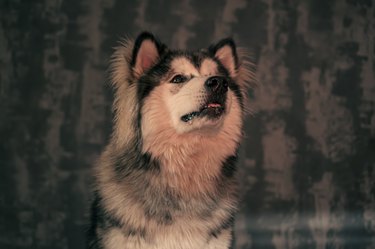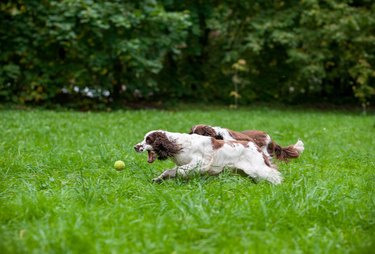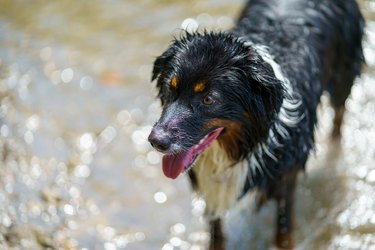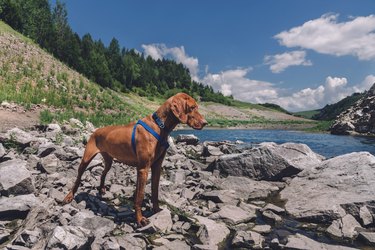Dogs, like humans, experience the occasional startling "a-choo!" that seems to come out of nowhere. If your dog has one of these isolated sneezes now and then, it probably isn't a cause for concern, as canines sneeze when irritants enter their nasal passages just like we do. But if your pet is suddenly sneezing; frequently sneezing; or having additional symptoms, like lethargy or a runny nose, they might have a medical condition that needs attention.

Video of the Day
You should see your veterinarian regarding any dog health concerns. However, until you can get a veterinary appointment — and as long as your dog's condition isn't accompanied by other symptoms — you can try easing their symptoms with some home remedies.
Video of the Day
Why do dogs sneeze?
Possible reasons for dog sneezing range from common causes like allergies and illnesses to foreign bodies in the nose. With allergies, the sneezing will be seasonal, and there will be discharge from both nostrils. Kennel cough, which is similar to a human cold, will include a dry, hacking cough and sneezing but often no other symptoms.

What causes dogs to sneeze?
There are a wide range of health issues that can cause a dog to sneeze, some of them serious and some of them mild. Your veterinarian might diagnose any of the below conditions. Note that it is important to keep your dog away from other canines if they are sneezing until you know the cause, given that kennel cough (and other bacterial or viral infections that cause sneezing) can be transmitted to other dogs.
Nasal blockage in dogs
Your dog might be sneezing because their nose is blocked. Foreign bodies like a blade of grass or even serious congestion in the nose can cause a dog to sneeze due to irritation and as a way of trying to dislodge the blockage. Grass, foxtails, and pebbles are among the most common foreign objects that veterinarians find in a dog's nose. Nasal polyps and tumors can also cause a dog to sneeze. A polyp, or soft tissue growth, is relatively rare and benign, while tumors can be cancerous or benign. If your dog has a nasal blockage, you might also observe nasal discharge, nose bleeds, and noisy breathing.
Dog allergies
Just like humans, dogs can react to a wide variety of allergens, including substances in the environment. Also similar to humans, one of the most obvious signs of environmental allergies in dogs is sneezing. If you notice that your dog's sneezing seems to be seasonal, chances are the culprit is allergies. Sometimes, sneezing will be the only allergy symptom, but dogs affected by seasonal allergies might also experience itchiness, nasal discharge, inflamed skin, or hair loss. Some dogs lick their paws excessively, resulting in a reddish staining on light-colored fur. Food allergies can also cause some of these signs. Your veterinarian can help you determine what your dog might be allergic to.
Nasal infections in dogs
In the case of infection, your dog might be severely congested with a stuffy, inflamed nose filled with mucus, pus, or fungal plaque. Dogs with viral, bacterial, or fungal ailments will most likely feel generally unwell, so if your dog seems lethargic, has a decreased appetite, has nasal or eye discharge, or is coughing in addition to sneezing, an infection might be the cause. If you suspect an infection, make a veterinary appointment right away, as these types of illnesses can progress rapidly in dogs. In very severe cases, an infection left untreated might be fatal to the dog.

Home remedies for sneezing dogs
A veterinarian is the best resource for assessing and treating the underlying cause of a dog's sneezing, but there are a few natural remedies pet parents can try at home to help their dog feel better in the meantime.
Humidity
Especially in the case of kennel cough, a humid environment may help to mitigate the dry, hacking cough your pet is experiencing. You can place a humidifier or vaporizer in the room where your dog sleeps. If you don't own a humidifier, run a hot shower and place your dog in the humid bathroom for a half hour. If your sneezing dog develops a dry, chapped nose, steam will also help ease the discomfort of this. You can also apply a bit of petroleum jelly to the end of your pet's nose if it's dry and chapped. You should only apply a small amount of ointment because your dog might experience gastrointestinal issues, like diarrhea, if they lick it off.
Rest for sneezing dogs
Just like when humans are feeling under the weather, dogs need extra rest while recovering from either allergies or an infection. Provide your dog with a comfortable and quiet place to sleep. In the case of kennel cough, it is best to limit your pet's exercise. Exercise can trigger coughing in your pet. The dog should only go outdoors for bathroom breaks. Keep your pet warm and dry at all times until they feel better.
Feeding a sick dog
Your dog's appetite may not be as strong as usual while they are suffering from allergies or kennel cough. Try warming canned food to intensify the aroma and stimulate your pet's appetite. Warmed chicken broth can also be a nice treat for a dog who has a cold or sore throat. Adding broth to their meal will also help to get some extra fluids into your pet.
Holistic remedies for dogs
There are homeopathic, herbal, and antioxidant remedies that may boost the immune system and help your dog recover from their cold more quickly. Echinacea is commonly recommended and is generally mixed into the dog's food for a week. Other herbs commonly used include licorice root, mullein, marshmallow, and coltsfoot. Vitamins C and E may also be used for reducing any inflammation that accompanies the sneezing and to boost the dog's immune system. Be sure to ask your veterinarian what vitamins and herbs are safe for dogs and find out the maximum daily dose of any canine supplements you plan to give.

What is reverse sneezing in dogs?
Reverse sneezing is literally the reverse of a sneeze — instead of expelling air from the nose, your dog sucks air into their nose. This can be loud and sound like snorting. It might also seem like the dog has something stuck in their nose or throat. A reverse sneezing episode is usually drawn out, lasting up to a minute. The same health issues that cause regular sneezing in dogs can also trigger reverse sneezing; however, many healthy dogs will also exhibit reverse sneezing. The cause of reverse sneezing in healthy dogs is usually undetermined, and most dogs who reverse sneeze return to normal after each episode without any adverse effects.
Reverse sneezing can affect any pooch, but brachycephalic dogs like pugs or bulldogs, which have short nasal passages, can be more prone to it.
When to see a veterinarian about a sneezing dog
It's always best to see your veterinarian if your dog is displaying any unusual symptoms. Whether your dog's sneezing is chronic or came on suddenly, the veterinarian can help figure out why. They will do a thorough examination of your dog's nose and throat, and they might also recommend radiographs, cytology, and bloodwork. They may also refer you to a specialist who can perform diagnostics, like rhinoscopy, CT scan, or tracheal wash. Depending on the diagnosis, your veterinarian will prescribe treatments such as antibiotics, antihistamines, or in rare cases, surgery.
The bottom line
Sneezing can be a sign of many different ailments in dogs, including viral or bacterial illnesses like kennel cough or canine influenza, allergies, or even cancerous tumors. While home remedies such as steam, special vitamins or supplements, or extra hydration can help to temporarily ease a sneezing dog's symptoms, it is important to seek veterinary attention to find and treat the underlying cause of the sneezing.